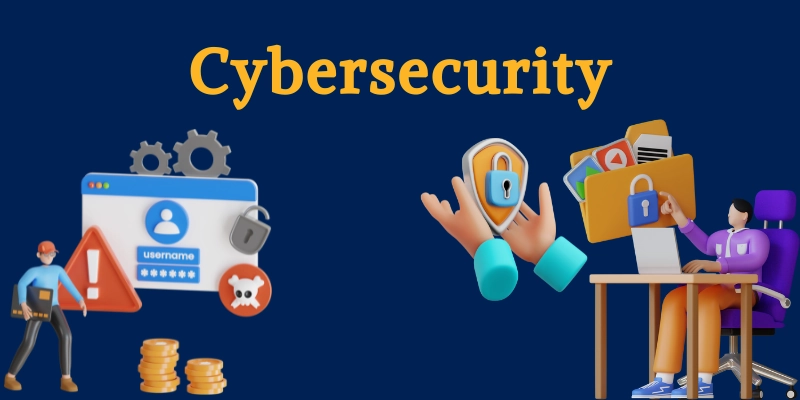Cybersecurity Made Simple to Keep Your Data Safe
Published: 13 Sep 2025
In today’s world, almost everything is online, making cybersecurity essential. It means protecting your devices, networks, and personal data from hackers and digital threats.
With cyber attacks growing every year, everyone, from students to businesses, faces potential risks.
In this article, you’ll learn the meaning of cybersecurity, its importance, and simple ways to stay safe online.
What is Cyber Security?
Cybersecurity definition is simple: it’s the practice of protecting computers, networks, and data from unauthorized access or attacks.

In other words, cybersecurity means keeping your digital information safe from hackers, viruses, and other online threats.
Example: Imagine someone tries to steal your bank details or personal photos online. Cybersecurity measures like strong passwords, antivirus software, and firewalls help protect your data from these hackers.
These are the cybersecurity basics everyone should know to stay safe online.
Why is Cyber Security Important?
The importance of cybersecurity is growing as more of our lives move online. It protects sensitive information like bank details, emails, and passwords from hackers.
Good cybersecurity also prevents financial loss and identity theft and ensures businesses stay safe from cyber attacks. This helps maintain trust in online services, from shopping websites to banking apps.
Example: In recent years, attacks like the Colonial Pipeline ransomware or data breaches at major companies show how easily personal and business data can be compromised.
Understanding why cybersecurity matters helps you see the benefits of cybersecurity, keeping your devices, information, and online activities safe from threats.
Types of Cyber Security Threats
Understanding cybersecurity threats is the first step to staying safe online. Here are the most common cyber threats everyone should know:
- Malware:
Harmful software like viruses, worms, and ransomware can damage devices or steal data. - Phishing attacks:
Fraudulent emails or websites that trick you into sharing personal information. - Man-in-the-middle attacks:
Hackers intercept communications between two parties to steal sensitive data. - Denial-of-service (DoS) attacks:
Overloading a website or network to make it unavailable to users. - Social engineering attacks:
Manipulating people into giving away confidential information, like passwords.
Knowing these types of cyber attacks helps you recognize risks and protect your information online.
Types of Cyber Security
There are several types of cybersecurity, each focusing on protecting different parts of digital systems:
- Network Security: Protects networks from unauthorized access, malware, and intrusions.
- Application Security: Ensures software and apps are safe from attacks and vulnerabilities.
- Information Security: Protects sensitive data like personal, financial, and business information.
- Operational Security (OpSec): Secures procedures, user access, and internal processes.
- Disaster Recovery & Business Continuity: Plans for restoring data and systems after cyber attacks.
- End-user Education: Trains users to avoid mistakes and recognize threats, reducing human error.
Understanding these types of cybersecurity helps individuals and businesses safeguard their digital assets effectively, from networks to sensitive data.
CyberSecurity Tools and Techniques
To stay safe online, it’s important to use effective cybersecurity tools and follow proven cybersecurity techniques. Here are some key methods:
- Firewalls and Antivirus Software: Protect devices from malware, viruses, and unauthorized access.
- Encryption: Secures sensitive data so only authorized users can read it.
- Multi-Factor Authentication (MFA): Adds an extra layer of security beyond just passwords.
- Security Audits and Monitoring: Regular checks to identify vulnerabilities and unusual activity.
- VPNs and Secure Connections: Protect online activity and personal data, especially on public Wi-Fi.
Using these tools and techniques is essential for protecting data and ensuring your online activities remain safe from hackers and cyber attacks.
Careers in Cyber Security
For readers interested in cybersecurity jobs, there are many exciting opportunities. Here are some popular careers in cybersecurity:
- Ethical Hacker / Penetration Tester: Tests systems for vulnerabilities before hackers can exploit them.
- Security Analyst: Monitors networks and systems to detect and prevent cyber attacks.
- Network Security Engineer: Designs and maintains secure network infrastructures.
- Cyber Security Consultant: Advises organizations on security strategies and solutions.
To start a cybersecurity career path, certifications like CompTIA Security+, CEH (Certified Ethical Hacker), and CISSP are highly recommended. These credentials help build skills and credibility in the field.
A career in cyber security offers growth, high demand, and the chance to protect data and digital systems worldwide.
Tips to Stay Safe Online
Staying safe online requires more than just antivirus software. Here are some simple online safety tips:
- Strong passwords: Avoid easy-to-guess passwords and update them often.
- Emails and links: Don’t click on unknown links or attachments to protect from cyber attacks.
- Updates: Updates fix security flaws and help prevent hackers from exploiting vulnerabilities.
- Backup data: Save copies of files in cloud storage or external drives in case of attacks.
- Antivirus Protection: Combine tools with smart habits for maximum security.
Following these tips teaches you how to stay safe online and reduces the risk of cyber threats.
Future of Cyber Security
The future of cybersecurity will become even more important as technology advances. With innovations like AI, IoT, and cloud computing, protecting devices and data will be a top priority for both individuals and businesses.
Emerging cybersecurity trends include AI-driven threat detection, zero-trust networks, and advanced cloud security solutions. These tools aim to prevent attacks before they happen and adapt to evolving threats.
Understanding the importance of cybersecurity in the future helps everyone prepare for safer digital experiences as technology continues to grow.
Conclusion
In this guide, we’ve learned about cybersecurity. Cybersecurity’s importance is clear; it protects your data, devices, and networks from online threats.
Everyone, from individuals to businesses, needs cybersecurity. Using the right tools and following safe online practices helps protect online data and stay secure.
Don’t wait for a cyber attack, secure your devices now and make safe online practices a daily habit! Share your thoughts in the comments below.
FAQs
Use these cybersecurity FAQs to strengthen your online safety. Start implementing these tips today!
AI will not replace cybersecurity but will become a powerful tool to strengthen it. Cybersecurity experts will still be needed to manage, monitor, and respond to threats that AI alone cannot handle.
Cybersecurity salaries vary depending on the role, skills, and location. On average, professionals in this field can make between $70,000 and over $120,000 per year, with higher pay for advanced positions like security engineers or consultants.
Cybersecurity is important because it protects personal data, financial information, and business systems from hackers and online threats. Without it, people and organizations risk identity theft, financial loss, and damaged trust in digital services.
Yes, many cybersecurity jobs can be remote since most tasks involve monitoring networks, analyzing threats, and securing systems online. However, some roles may still require on-site work for handling hardware or sensitive company data.
Cybersecurity protects computers, networks, and data from hackers, malware, and other online threats. It works by using tools like firewalls, encryption, and antivirus software to keep information safe and ensure secure digital communication.
One of the highest-paying cybersecurity jobs is a Chief Information Security Officer (CISO), who earns well over $150,000 per year on average. Other top-paying roles include security architects and penetration testers with advanced expertise.
Cybersecurity professionals work in many places, including businesses, government agencies, banks, healthcare, and tech companies. They can also work in remote setups, securing networks and data for organizations worldwide.
Everyone who uses the internet needs cybersecurity, from students and everyday users to businesses and governments. It protects personal data, financial information, and critical systems from hackers and online threats.

- Be Respectful
- Stay Relevant
- Stay Positive
- True Feedback
- Encourage Discussion
- Avoid Spamming
- No Fake News
- Don't Copy-Paste
- No Personal Attacks

- Be Respectful
- Stay Relevant
- Stay Positive
- True Feedback
- Encourage Discussion
- Avoid Spamming
- No Fake News
- Don't Copy-Paste
- No Personal Attacks





